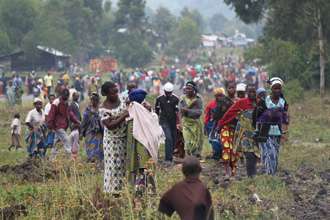Millions of people in eastern Democratic Republic of Congo are now at the mercy of militias as the country’s long-running conflict descends into widespread lawlessness with killing, kidnapping and abuse against the population at alarming levels, international agency Oxfam today.
 Killing, kidnapping, rape and displacement increases dramatically across the Kivus, Oxfam warns
Killing, kidnapping, rape and displacement increases dramatically across the Kivus, Oxfam warns
Millions of people in eastern Democratic Republic of Congo are now at the mercy of militias as the country’s long-running conflict descends into widespread lawlessness with killing, kidnapping and abuse against the population at alarming levels, international agency Oxfam today.
Local organisations Oxfam works with are reporting a steep increase in forced child recruitment, killing, looting and rape across the two eastern provinces of North and South Kivu due to a security vacuum and a proliferation of armed groups.
Rebel groups have taken control of vast swathes of the east, Oxfam said today, leaving a terrifying absence of state authority and security. Close to half a million people have fled their homes in the past four months and a humanitarian crisis has descended into “catastrophe”.
As regional leaders meet in Kampala, Uganda to seek a resolution to the conflict at the International Conference of the Great Lakes Region on 7 and 8 August, Oxfam says that protection of civilians and a resolution to the regional dimensions of the conflict must be top of the agenda.
“We have reached a new depth of misery in Congo’s conflict when massacres go virtually unnoticed,” said Oxfam’s Associate Country Director Elodie Martel. “Vast swathes of the east have descended into chaos with no government or security presence. People have been abandoned to killing, rape, looting and extortion. They are fleeing for their lives and very little is being done to help.”
A mutiny within the Government Army in April triggered a new rebellion, M23, in the east and prompted a government offensive around the town of Rutshuru in North Kivu. The focus on M23 has pulled security forces from other fragile areas of the east, leaving opportunistic militia groups battling for control of villages and towns.
Hundreds of people have been killed in attacks against villages in South Kivu, houses burnt and people kidnapped according to local and UN reports. One village in Lubero, North Kivu, has been under control of a notorious rebel group since May with no police, army or government presence. Forced labour is widespread, with a $10 fine for non-cooperation; people face abduction if they denounce abuse according to local groups Oxfam works with.
The humanitarian consequences of the conflict are huge, Oxfam said. Cholera is a real risk in displacement camps surrounding Goma and across many areas of the east, while insecurity is making aid delivery to remote and conflict-affected areas extremely difficult. Since January more than 20,000 cases of cholera and 481 deaths have been reported across the country.
Movement of people is chaotic, with thousands fleeing on a daily basis, sometimes returning home, hiding for weeks in the forest, staying with neighbours of friends or setting up makeshift shelters in camps. The highly unpredictable conflict means areas are frequently changing hands with rebels and government troops accused of looting homes and harvesting people’s fields as they move from one offensive to the next.
It is the crucial harvest season but people are too afraid to go to their fields to farm or are displaced far from home and unable to gather their crops say local organisations Oxfam partners with. A whole host of rebel groups are stealing crops or enforcing illegal taxes if farmers try to transport their goods to market. In Rutshuru people are being charged 300 USD for a truck to pass points along the main road and 50 USD for smaller vans, putting a massive illegal tax on traders and farmers, while shopkeepers in Rutshuru say they are too scared to keep their businesses open in case they are looted.
“The lack of action to stop massacres and abuses against Congolese people is appalling,” said Martel. “The United Nations, the Congolese government, regional governments, the international community – everyone needs to stop the catastrophe in Congo once and for all. We should no longer be calling this a forgotten war. The realities of torture, rebel rule and absolute terror should be etched on every politicians’ mind and top of their agenda.”
- View the conflict in pictures with this slideshow from the UK’s Guardian.



